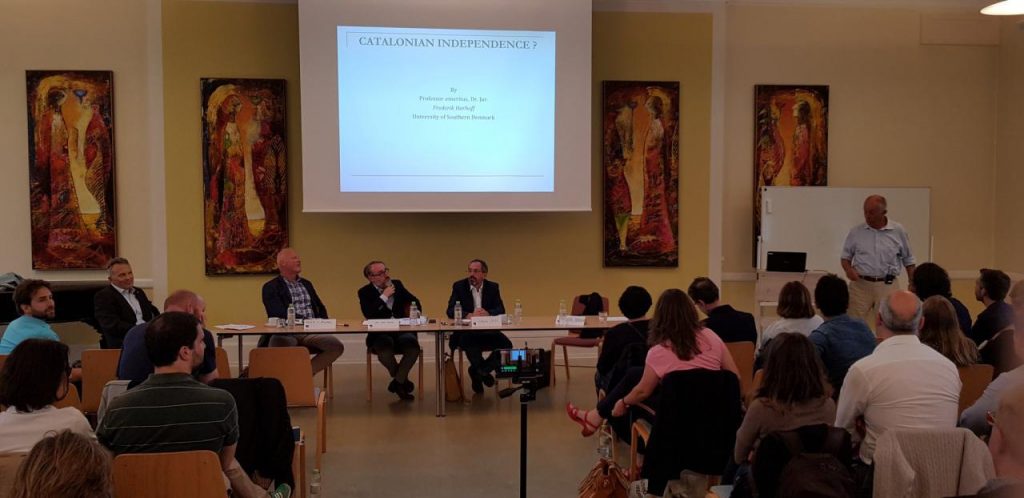Last Monday, June 11th, Copenhagen was the site of a debate, organized by the 92,000-member strong Danish Association of Lawyers and Economists (Djøf), on one of the most significant Catalan political events of the last few decades: the legal aspects of the October 1st independence referendum, the attacks on voters by the Spanish State security forces, and the legal foundations and implications of everything that has happened since then.
Under the heading “Catalonia – lovbrud eller magtmisbrug?” (Catalonia: Breach of Law or Abuse of Power?), the debate, hosted by business leader Kaare Nørgaard, served to encourage reflection and offer answers about the origins of the conflict, the Spanish point of view, the contents of the Spanish law, and the perspective of international law and human rights on the situation, in a country that was deeply concerned by the police violence which took place on October 1st. The debate delved into the subject matter and helped present it to the Danish audience.
Professor Emeritus Frederik Harhoff, of Syddansk Universitet, based in Odense, and expert in international law and a senior legal civil servant in the chambers of the UN International Criminal Court for the former Yugoslavia, explained the paths in international law for effectuating the right to self-determination, asked Spain not to commit the same error as with the violence that took place in Kosovo, and recognized that Spain’s Constitutional Court ruling of 31/2010 on the Statute of Autonomy of Catalonia resulted in the loss—without negotiation—of certain rights that had been previously devolved by the State.
Peter Vedel Kessing, researcher for the Danish Institute for Human Rights and a professor in the University of Copenhagen Law School, and a specialist in international law, human rights, terrorism and armed conflict, stated that the right to self-determination is not a matter of international law but rather a political matter, and that, in the case of a clear desire for independence, there must be room for political negotiation. He also accepted that given the circumstances, Catalonia could demand remedial secession.
Jordi Jaria i Manzano, professor of Constitutional Law and a member of the Center for Environmental Law Studies at the Universitat Rovira i Virgili, based in Tarragona, insisted that he would offer only facts and not hypotheses, referring to Catalonia’s Statute of Autonomy “approved as a result of a negotiation”, and illustrated how the Spanish Government had responded to the Catalan independence process with legal measures, thereby diminishing the possibility of the political negotiation that he defends, and at the same time how powerful the pressure is from media outlets in favor of the status quo.
Joaquín Pablo Urías Martínez, professor of Constitutional Law at the University of Sevilla and former lawyer in the Constitutional Court, warned that the Spanish State is turning into a less democratic state, and that what it is doing in Catalonia—for example, among other things, blocking de facto the election of Carles Puigdemont as president or keeping members of the Catalan Government in jail for their political ideas—affects everyone in Spain because the entire State (judicial, legislative and executive branches) is taking part in the conflict “whose ultimate objective is saving Spain” but by violating the Constitution in detriment to the democracy.
The debate, in English, was broadcast live and concluded with questions and participation from the audience, which included several members of the Danish Parliament. Magni Arge, a member of the Republican Party, made it clear that Europe must respect the right of self-determination and that what is necessary is more courage and more dialogue with regards to the Catalan conflict.


